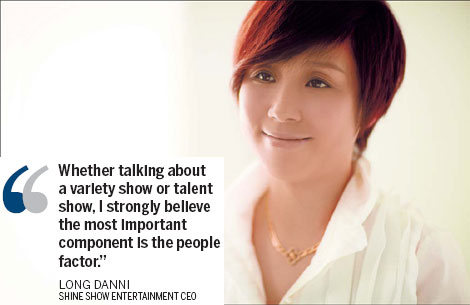Life and Leisure
Winning the fame game
By Gan Tian (China Daily)
Updated: 2010-09-07 08:07
 |
Large Medium Small |
|
"If you find the right person, magic follows," says Long Danni, whose pioneering TV shows have set new standards for television. Photos Provided to China Daily |
The "godmother of Chinese talent shows" talks about turning the brightest contestants into stars, Gan Tian reports
It's the final episode of Hunan TV's latest talent show I Want to Direct a Movie, and the three young girls on stage appear to be as nervous as director Long Danni who is in the audience. The contestants stand before judges Peter Chan, Wong Bak-ming and Ning Caishen - some of the biggest names in the country's film industry.
The TV program has invited 10 young contestants to make short video clips about a different theme each week, which the three judges will assess to decide who goes on to the next round.
Long breathes deeply as Chan, the lead judge, announces the winner - 27-year-old Zhou Nan.
Zhou is Long's favorite candidate, and the director believes he has perhaps discovered a new dynamo in the same way she herself was discovered by Hunan Economic Television (ETV) nearly two decades ago.
"Whether talking about a variety show or talent show, I strongly believe the most important component is the people factor," Long says.
"If you find the right person, magic follows."
Zhou will sign a contract with Shine Show Entertainment Co to direct its first movie, Just For You, which will premiere around next Valentine's Day.
The show is Long's brainchild. The 39-year-old Shine Show Entertainment CEO is known as the "godmother of Chinese talent shows".
"Young film directors don't get many work opportunities. Although it's only a talent show, I Want to Direct a Movie provides a platform for them," Long says.
"In this way, my company offers them a chance to make their own movies. A talent show can be more than just a singing competition."
Long started her TV career when she joined ETV upon graduation from Zhejiang University of Media and Communications in 1994.
She was hired to be a presenter of the variety show Lucky 3721, on which celebrities perform and share their lives. But her boss told her that she wasn't "beautiful enough" after the first episode.
"I remember it clearly. I was all ready for the second episode, but he just told me to get off the stage. So I switched from being a TV presenter to working as a producer," Long says.
And she immediately came up with several innovative concepts for Lucky 3721.
"China's variety shows were too serious at that time. But I understood our mission was to make people feel good. So, we used a simple way to accomplish that - games."
Having stars play games with audience members brought them closer together and removed the celebrities' "invisible crowns".
The average audience rating of a variety show then hovered around 5 or 6, and 10 was the absolute highest - that is, until Lucky 3721 set a new record of 60.
"It suddenly occurred to me that a variety show isn't that complicated," Long says.
"It's merely a mode of communication among people. When you bring down the walls separating people, it becomes interesting. I have cultivated this skill very well since having that realization."
